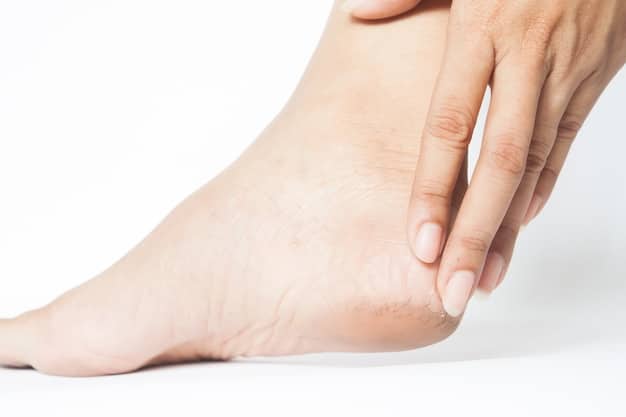Home treatments, such as balms and exfoliating, may help soothe cracked heels. However, a doctor may suggest an alternative therapy if your heels are badly cracked, or you have diabetes. Heels that have cracked are a typical foot issue. According to a study, 20% of people in the United States have cracked skin on their feet. Both adults and children are at risk, with women more likely to be affected than males. Cracked heels are usually not a major issue. Going barefoot on it could hurt. Extremely painful and profound heel cracks might develop on occasion.
What Are Cracked Heels?
A common issue with the foot is a cracked heel. It develops when the thick, dry skin of the heel starts to crack and break. Minor heel fissures are usually only an annoyance and an eyesore. Still, if left untreated, they may become unpleasant to walk on and even infected if not properly cared for.
Causes & Risk Factors
A cracked heel may develop over many stages. The first sign is calluses, which are thick, dry patches of skin around the heel. The fat pads beneath your heels expand as you walk, causing the calluses to develop tiny cracks.
The following factors may also cause cracked heels:
- Standing for lengthy periods, particularly on hard surfaces, may cause discomfort.
- Sandals, shoes, and thongs with no back support are hard, unsupportive footwear examples.
- Barefoot walking is dangerous since your feet will be unsupported.
- Obesity
- Bathing in steaming hot water
- Chronic illnesses like diabetes
The fissures will widen and even bleed as time passes. Infection is a real possibility if the cracks are deep enough, and diabetic foot ulcers may form on the skin of the foot if the heel is fractured.
Cracked Heel Symptoms
When the skin surrounding your heel gets injured and thickened, cracks appear. The visible fissures are the result of the skin splitting as a result of the injury. Most people will be able to tell they have cracked heels just by looking at them, but you may also have the following symptoms:
- Scaly skin
- Itching
- Pain/soreness
If your symptoms get worse, like if you get ulcers, your heel swells, and you lose feeling, you might have an infection that a doctor needs to treat.
How to Treat Cracked Heels
- Rub some heel crack cream into your skin to start the day on the right foot.
- Apply lotion to your heel twice or thrice daily.
- Wear shoes with heel protection
Prevention
You may avoid having cracked heels by using one of many measures:
- Use a thick moisturiser (not between the toes) daily to maintain soft, supple skin on your feet. A urea-based moisturiser is ideal.
- Keep an eye on your feet every day for any symptoms of wear and tear, such as cracks.
- Avoid thongs, bare feet, and open-back sandals as much as possible. Choose supportive footwear that won't irritate your skin instead.
- Put on some stockings and some nice socks.
- Don't stand on your feet for too long.
- Hydrate yourself by consuming large amounts of water.
Use Caution
If a medical ailment is the root cause of your cracked heels, home remedies won't cut it. There may be a need for specialised care from a podiatrist. A podiatrist should look at severely cracked heels regardless of your health background. Your doctor will provide you with tips on how to deal with your condition.

Isreal olabanji a dental assistant and public health professionals and has years of experience in assisting the dentist with all sorts of dental issues.
We regularly post timely and trustworthy medical information and news on Fitness, Dental care, Recipes, Child health, obstetrics, and more.
The content is intended to augment, not replace, information provided by your clinician. It is not intended nor implied to be a substitute for professional medical advice. Reading this information does not create or replace a doctor-patient relationship or consultation. If required, please contact your doctor or other health care provider to assist you to interpret any of this information, or in applying the information to your individual needs.


